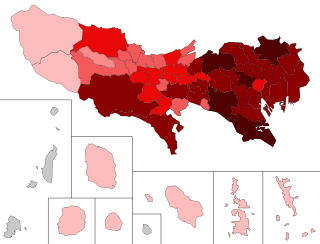
A migrant worker is a person who migrates within a home country or outside it to pursue work. Migrant workers usually do not have the intention to stay permanently in the country or region in which they work.

Ryoko Yonekura is a Japanese actress and former fashion model best known for her role in the Japanese medical drama Doctor-X: Surgeon Michiko Daimon. She also performs the voice of Black Widow in the Japanese-language releases of the Avengers film series.
Shinichi Tsutsumi is a Japanese stage and screen actor. Internationally, he is best known for his roles as Koichi Takagi in the Monday films, Tetsuya Ishigami in the Suspect X films, and Jo Sawashiro in Yakuza: Like a Dragon. In Japan, he is best known for his roles as Ōsuke Nakahara in Yamato Nadeshiko of drama series, and Norifumi Suzuki in Always: Sunset on Third Street films. He won the Japanese Academy Award for Best Supporting Actor in 2005 for Always: Sunset on Third Street. In 2013, he was nominated for an International Emmy Award for best actor for his role in Yasu – A Single Father’s Story.
Eita Nagayama, occasionally credited mononymously as Eita, is a Japanese actor from Tokyo. He has appeared in many Japanese television dramas and movies; most notable is the TV series Water Boys. He also appeared in Summer Time Machine Blues and Tokyo Friends: The Movie.

The invasion of Ryukyu by forces of the Japanese feudal domain of Satsuma took place from March to May of 1609, and marked the beginning of the Ryukyu Kingdom's status as a vassal state under the Satsuma domain. The invasion force was met with stiff resistance from the Ryukyuan military on all but one island during the campaign. Ryukyu would remain a vassal state under Satsuma, alongside its already long-established tributary relationship with China, until it was formally annexed by Japan in 1879 as the Okinawa Prefecture.

Hidetoshi Nishijima is a Japanese actor model. He is widely regarded as one of Japan's leading actors, having appeared in a wide range of films from science fiction films such as Shin Ultraman (2022) to small-scale art films such as Dolls (2002). He gained international recognition for his critically acclaimed leading role in the 2021 film Drive My Car, for which he received the Japan Academy Film Prize for Best Actor.
Indonesians in Japan form Japan's largest immigrant group from a Muslim-majority country. As of June 2023, Japanese government figures recorded 122,028 legal residents of Indonesian nationality.

Yuki Yamada is a Japanese actor. He is associated with Watanabe Entertainment's male acting troupe D-Boys since 2010 and made his acting debut in Kaizoku Sentai Gokaiger (2011). Notable works he has also starred in include High & Low tv and film franchise (2015-2019), Strobe Edge (2015), Tokyo Revengers (2021), Godzilla Minus One (2023).
Nigerians in Japan form a significant immigrant community. There are around 3,700 Nigerians living in the country. They mostly belong to the Nigerian Union in Japan, which is divided into sub-unions based on states of origin. The vast majority of Nigerians arrived in Japan from the mid-1980s onwards.

The Jakarta Japanese School is a Japanese international school in Pondok Aren, South Tangerang, Indonesia. It is regionally located in the Greater Jakarta area.
Ryoma Takeuchi is a Japanese actor, model and television personality who is affiliated with Horipro. He was a Rissho University Global Environmental Sciences student. He is best known for his role as Shinnosuke Tomari, the main character of the Kamen Rider series Kamen Rider Drive.
Yuki Kubota is a Japanese actor and model whose work has included stage, television and film roles. He is best known as the character Takatora Kureshima / Kamen Rider Zangetsu / Kamen Rider Zangetsu Shin in the Kamen Rider series Kamen Rider Gaim. He is currently affiliated with the Japan Music Entertainment agency.
Shōgō Yasumura, better known as Tonikaku Akarui Yasumura or 'Tony' Yasumura, is a Japanese comedian who is represented by the talent agency, Yoshimoto Creative Agency. He was a former member of Armstrong. He graduated from Tokyo NSC 6th generation.

Ikusaburo Yamazaki is a Japanese actor and singer who is represented by Ken-On.

Harold George Meij is a Dutch businessman, he was the president of New Japan Pro-Wrestling (NJPW) from May 2018 until October 2020.

Janni Olsson is a Swedish TV host, model, actress and outdoor columnist. She is the creator, producer and host of the outdoor documentary series Getting Dirty in Japan which started streaming on Amazon Prime Video in Japan in April 2023 and is known for her appearances on Japanese television shows such as Trails to Oishii Tokyo(former Trails to Tsukiji), Cycle Around Japan, J-Trip Plan, Tokyo Eye 2020, and Journeys in Japan of NHK World-Japan. Olsson plays the character Alena Treasurehunter in the Amazon Prime Video series The Benza and its spin-off series Benza English and the video game The Benza RPG.

The first case relating to the COVID-19 pandemic in Tokyo, Japan, was confirmed on January 24, 2020, and on February 13, 2020, the first infection of a Tokyo resident was confirmed. On March 26, 2020, the Tokyo Metropolitan Government established the "Tokyo Novel Coronavirus Infectious Diseases Control Headquarters" based on the Act on Special Measures against New Influenza.

Sanseitō is a right-wing populist political party in Japan. The party was founded in 2020 and won a seat in the 2022 House of Councillors election, also becoming an official political party by winning more than 2% of the vote in the election.











